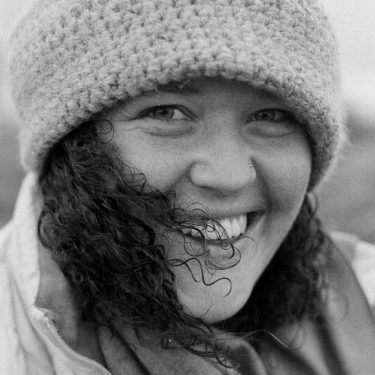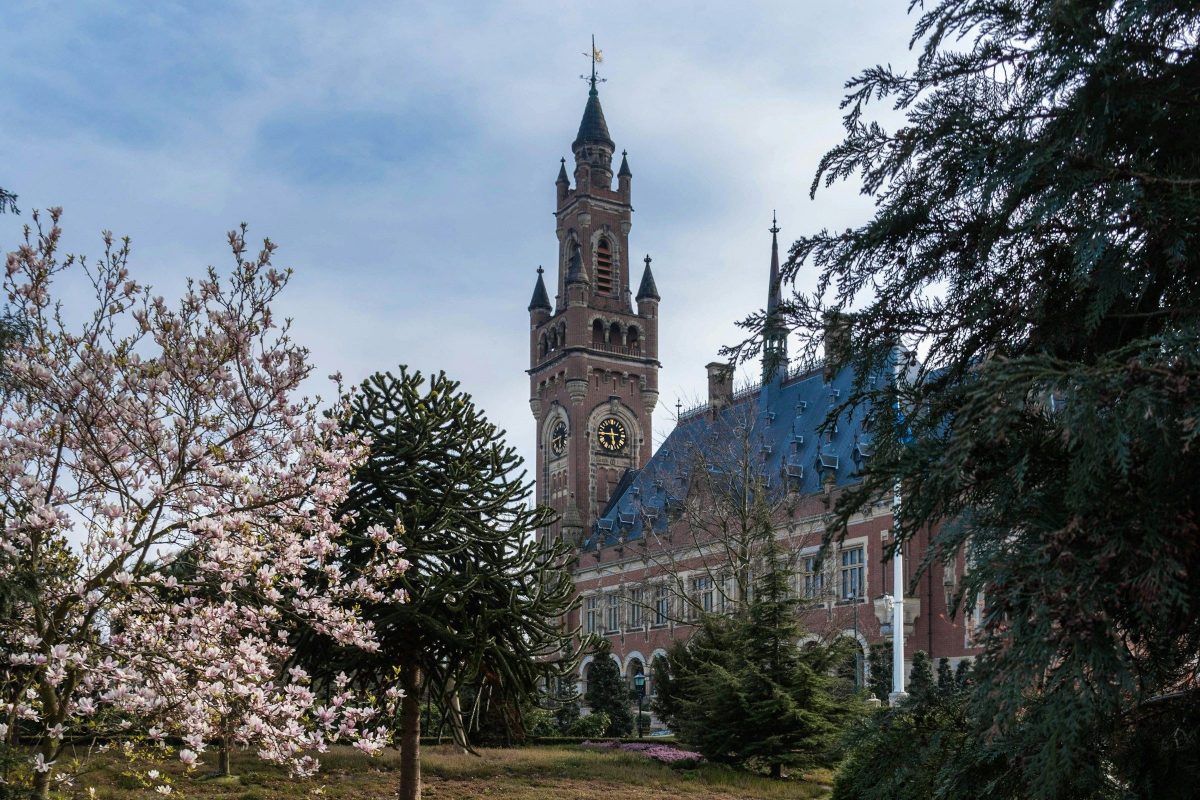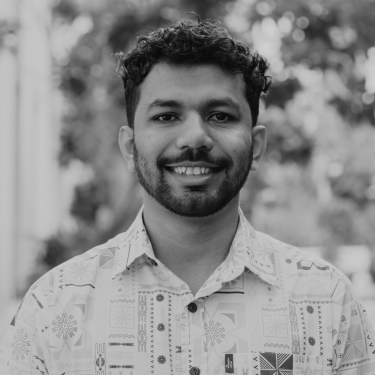- Symposium
- Systemic Impacts and Structural Shifts: Climate Change and the Role of the ICJ Advisory Opinion
Both a ‘Global’ and an ‘International’ Court of Justice
The ICJ is a State-centric body – it handles disputes between States, and only representatives of States have an audience with the Court. However, the proceedings of the ICJ in the Obligations of States in respect of Climate Change Advisory Opinion (‘Climate AO’) have exhibited elements symptomatic of an international legal system operating beyond a purely state-centric paradigm.
In their editorial to this symposium, Khaled El Mahmoud, Jannika Jahn, and Moritz Vinken introduce structural and systemic transformations of the international legal order, of which the ICJ advisory opinion is both a reflection and a catalyst. Their list describes an emerging international legal architecture that is integrative, rooted in multilateral cooperation, ecologically orientated, and reaching increasingly into the domestic sphere through a gradual piercing of the sovereign veil. This contribution argues that a further structural transformation regards the recognition, influence, and interrelationship of the different subjects of international law, indicative of a legal order in which the classical legal categories are questioned, challenged, and potentially reshaped.
While the authority of this Advisory Opinion (‘AO’) derives from its status as an opinion of the ICJ, and its associated State-centric mandate, there are also elements of significance that lie behind it and play out in the spaces surrounding its institutional consideration. They reveal an international legal order in a phase of broadening and opening up to a diversity of actors and influences beyond the State. The associated shifts in influence and legitimacy of a diversity of actors are evidenced in and around the Climate AO through interrelated procedural and substantive symptoms of a broader questioning. Viewing this AO through too narrow an analytic frame runs the risk that significant elements (such as the ‘archive of narrative microhistories’ discussed by Rashmi Dharia in this symposium) become lost within the classical narratives of international law, and these ‘subject’ related structural transformations become overlooked as falling outside of the State-focused frame of consideration.
The Stage and the Actors
The four types of actors at the forefront of this piece are: the State, as the traditionally considered base unit or subject of the international legal system, including recently decolonised States whose membership of the ‘international community of States’ is more recent; civil society, a catch-all term that can include a wide range of actors, including individuals, networks, and organisations and which refers broadly to those actors operating ‘below the level of the State’; the individual, whose accommodation in international law has been the subject of recent legal scholarship; and Indigenous peoples, whose status in international law has been progressively recognised, including through international agreements of 1989 and 2007, and whose status continues to be developed and clarified.
While the interrelationship and status of these actors as ‘subjects’ of the international legal order is in constant flux, the ICJ is an organ in which the primacy of the State is concretely embedded. This embedding is both procedural and substantive, and exists in both its contentious and advisory jurisdictions. The jurisdiction of the Court is activated through State request: either by States directly in the case of its contentious jurisdiction, or indirectly in the case of its advisory jurisdiction. The advisory jurisdiction is activated at the request of UN Organs or specialised agencies whose authority derives from State consent (most often the UN General Assembly which as requested which has requested 18 AOs).
The Climate AO falls within the Advisory Jurisdiction of the Court and results from a request originating in the UN General Assembly and was adopted by consensus of the member States. Behind that request lies an extensive campaign carried out by, among others, the Pacific Islands Students Fighting Climate Change, a civil society organisation representing Pacific Youth who have worked alongside a coalition of civil society actors (see the contribution of Lovleen Bhullar to this symposium) and significantly shaped oral and written statements, as well as the atmosphere surrounding the Climate AO. This contribution places focus on that ‘behind the scenes’ activity.
Symptoms of Wider Structural Transformations
Procedural: Emphasis on Testimonies
Civil society holds significant, and potentially increasing, influence in the international legal order. The symptoms of this can be seen procedurally in relation to the Climate AO. Civil society was influential in: the commencement of the proceedings, including by campaigning among member States of the UN General Assembly; the drafting of written pleadings; the preparation of oral arguments; and presenting during Oral proceedings as invited by State delegations. The presence and influence of civil society is, in itself, symptomatic of an open and porous international legal order, but the contributions of these actors, and the matters which they emphasised, are further symptomatic of, and significant contributions to, the structural shifting and questioning around ‘subjecthood’.
The Alliance for a Climate Justice Advisory Opinion, a civil society coalition, placed significant emphasis on individual and community voices from the grassroots, including those of Indigenous peoples. In some cases, they did so internally to the proceeding with the objective of encouraging States to include witness testimony in their submissions, which they hoped would be influential even if not cited directly (such as the Book of Exhibits contained in the written submissions of Vanuatu discussed by Rashmi Dharia in this symposium, or the Witness Statements provided in the written statements of the Melanesian Speahead Group).
In addition, the ‘People’s Petition’ was created – a 102-page document containing testimonies from affected communities couched in a legal analysis, and presented during oral proceedings in an effort to ensure that individuals impacted at the grassroots were represented, and that legal concepts were considered with that reality in mind. This document, as a civil society submission, faced challenges regarding it’s weight and the procedure for it’s submission as do all NGO or Civil Society submissions and reports before the ICJ (discussed by Riddel and Plant, pps. 247-250, 366-368), which, consistently with other UN organs, are increasingly common in ICJ proceedings. Thus, while not traditional ‘subjects’ with a right to audience before the Court, the testimony of individuals and communities, together with civil society, were significant features which permeated an otherwise state-centric process.
Interlinked Procedural and Substantive: A Global Audience
The effort to hear from individuals and communities extended beyond the Courtroom, also finding expression in forums addressing a global audience. The size of that audience, and efforts to address it directly, indicate that these proceedings are viewed as more than a purely interstate concern by civil society and the global public alike.
While decisions of the ICJ have always been of concern to States, they have not always been of such significant public concern or the subject of such public attention. Outside of the Courtroom, the global public was addressed through many mechanisms, among them the ‘Witness Stand for Climate Justice’, which aimed to ensure that human experiences were centred and those on the frontline platformed. This involved a library of testimonies on climate impact, which could be accessed physically in the Hague through touch screens as well as online. A People’s Assembly was held, in which witnesses presented testimony publicly. Vishal Prasad explained that one objective of the Pacific Islands Students Fighting Climate Change campaign was a ‘visionary’ one in which the global nature of the case would be reflected in the accessibility of the process by addressing not only the judges but also ordinary people. The hearings were also accompanied by a significant presence outside the Peace Palace, and the progress of the proceedings was reported on multiple platforms.
Juliette McIntyre discusses, in relation to the recent Provisional Measures Hearings concerning Gaza, how the Court in those hearings, as perhaps in all hearings, engaged in a performance by which the courtroom becomes a theatre of justice both for the Court and for the general public, who mobilised to observe those proceedings to a new extent. That novel level of mobilisation was seen, if not expanded on, in the Climate hearings. The level of public attention placed on the Court’s recent cases could arise from many factors, surely in part because the ICJ is considering the type of issues of general concern to the international public. The question considered in the Climate AO, which is one whose drafting was significantly influenced by civil society involvement, is one that touches on all layers of the international community (non-exclusively: individuals, civil society, communities, peoples, and States). The text of the question itself asked the Court to consider not only the obligations of States with respect to harm caused to other States, but also with respect to the harm caused to individuals and peoples. But there seems to be something more: Is it because of the ease of engaging with these proceedings in the internet era? Is it because the ‘international community’ has shifted somehow into a global community in which individuals, communities, and civil society feel a part and experience a concern for? Or is it simply because the international legal order has now developed to such an extent that, together with the sovereign veil, it now addresses topics of wide public concern far beyond States.
Substantive: Mixed Legal Vocabularies
A substantive consequence of the inclusion of individual voice and narrative in State submissions is the introduction of mixed legal vocabularies. For example, in the Climate AO miced legal vocabularies were represented, for example, on the futurity of international law and the concept of intergenerational equity.
As a procedural matter, the Court does not often hear testimonies, though States can include them in their oral submissions (Riddel and Plant, pps. 307-311). In the Chagos Islands AO the Court heard from Madame Elyse, a 65 year old Chagossian woman who spoke of the colonial history of the Chagos in a moment that has been called ‘ground breaking’ for its inclusion of the voice of the community in an interstate proceeding, and an example of the hearing of Indigenous testimony at the ICJ which introduced mixed legal vocabularies to the consideration of self-determination. In the Climate AO, mixed legal vocabularies are presented by Cynthia Houniuhi, president and founding member of the Pacific Islands Students Fighting Climate Change, who presented on behalf of the Republic of Vanuatu and the Melanesian Spearhead Group. She referenced testimony of another witness before the ICJ, Lijon Eknilang from the Marshall Islands, who spoke on the impact of nuclear weapons on her family and community (providing the kind of narrated in concreto assessments discussed, again, by Rashmi Dharia). In her own statement, Cynthia Houniuhi presented the legal principle of intergenerational equity in the context of, and as an expression of, the duty to protect the environment for future generations as it exists in her culture, thus presenting a vocabulary through which to understand the legal concept under consideration. That vocabulary is also reflected in the submission of Vishal Prasad in his rebuttal of the idea that future generations are ‘abstract’ and his reference to international justice, and the role of the Court, as one of ‘wayfinding’, a practice connecting past and future – those who came before with those who will follow. Both of these submissions present a vocabularies through which to grapple with the futurity of international law (potentially contributing to the Courts ‘substantive grasp’ of the future through the finding of intergenerational equity as an interpretative principle discussed by Jochen Rauber in this symposium).
Mixed legal vocabularies also found expression through representatives of States (rather than as attached to State written submissions). While this is a legally important distinction in the context of a State-centric Court, it is perhaps an artificial distinction in a case in which State delegations and witnesses often spoke from comparable positions regarding their experience of climate impacts. In their role supporting especially the delegations of Pacific and Small Island Developing States that had not previously presented before the ICJ, civil society actors encouraged mixed legal vocabularies, including Indigenous legal vocabularies. They did so, inter alia, by: encouraging representation by citizens, rather than hiring external representation by professional lawyers as is the norm in ICJ proceedings; and by embracing culture and traditions of those States, including presenting legal principles and arguments in ‘a Pacific way’ and in Pacific languages. Indeed, these oral hearings were the first in which Global North States’ submissions were outnumbered by those of the Global South, and saw the highest number of Indigenous people presenting before the ICJ in comparison to any previous hearing.
The Opinion
While it’s impossible to know how much civil society influenced the Court, or how any of these ideas permeated the thinking of the bench, the AO delivered by the Court on 23rd July 2025 aligns in many ways with the campaign conducted by civil society, indicating that these actors and their ideas and goals likely permeated this process in at least some aspects. The AO places great emphasis on human rights obligations (see the discussion of Helen Keller in this symposium), including the quite remarkable finding that the right to a clean, healthy, and sustainable environment as a ‘precondition’ to, and inherent in, the enjoyment of other human rights (para 393). This strong human rights stance is aligned with the focus of the coalition of civil society actors operating around the Climate AO, who encouraged an approach that recognised the very real impact on individuals. The separate opinion of Judge Charlesworth even cites directly to witness testimony in considering the legal, and particularly human rights, questions posed (paras 17-22).
While text of the AO did not reference directly the mixed legal vocabularies used in relation to, for example, the concept of intergenerational equity, it did make reference relating to the different understandings of this concept as expressed by the parties (para 155) and emphasised its importance (paras 157 and 273), including by acknowledging that the human rights of future generations are dependant on environmental preservation (paras 373 and 377). It also made a very significant finding on the recognition of intergenerational equity as a form of equity (para 157) (and as an interpretative principle, see again the contribution of Jochen Rauber in this symposium). These concrete findings on the concept of future generations are consistent with the emphasis encouraged by the coalition of civil society. Perhaps inspired by the Oral presentations, several judges even used sayings or mixed vocabularies in their separate opinions, including in the separate opinions of Judge Bhandari referring to Bhūmi Devi (para 10), Vice President Sebutinde with the ‘wise African saying’ “[w]e do not inherit the Earth from our ancestors; we borrow it from our children” (para 7), and Judge Tladi with the Cree proverb “[o]nly when the last tree has been cut, only when the last river has been poisoned, only when the last fish has been caught, only then we will realize, that money cannot be eaten”(ftn 34).
On the question of the subjectivities ‘peoples and individuals of the present and future generations’, the separate opinion of Vice President Sebutinde criticises this element of the Court’s decision as ‘not going far enough’. She argues that the Court conflated the issue of the legal obligations owed to peoples and individuals, as categories of subject beyond the State (para. 4) which include both those currently living and those yet to be born (para 7), with the question of ‘locus standii’, being their ability to bring a claim as against a State. By doing so, she argues that the AO falls short of addressing the questions posed regarding the obligations owed to non-state categories (paras 3-7), and argues that the Court should have gone further in addressing the status and interrelationship of subjects beyond the State in international law.
Conclusion
This piece argues that the Climate AO and its proceedings, both inside and outside the Courtroom, illustrate an international legal order that is permeated by, and receptive to, actors and influences beyond the State. While it is too early to judge the extent or outcome of a ‘structural transformation’ regarding the recognition, influence and interrelationship of ‘subjects’ of international law beyond the state, symptoms of a current questioning of these classical legal categories and associated state centrism, and signs of potential resulting transformations, are seen. These symptoms are visible throughout the Climate AO, especially in: the overall influence of civil society in all stages of the proceeding, and potential penetration of civil society ideas into the opinion of the Court; the focus on the voices of individuals and communities in written and oral submissions; the focus on diverse legal vocabularies, including Indigenous legal vocabularies, in written and oral submissions; the addressing of questions of broad public concern beyond the State; the formulation of a question that explicitly asks the Court to consider subjects beyond the State; the criticism in the separate opinion of Vice President Sebutinde that the Court did not go far enough in addressing questions around subjects beyond the State; and the interest in this proceeding expressed by a global community of non-state subjects, who became a global audience addressed during it.

Lillian Robb (she/her) is a PhD candidate in International Law at the Graduate Institute of International and Development Studies in Geneva

